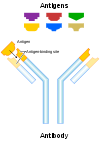- Neutralizing antibody
-
Neutralizing Antibody 
Standard antibody representation.Properties Protein Type Immunoglobin Function Neutralization of Antigens Production White B-cells[1][2] antibody which defends a cell from an antigen or infectious body by inhibiting or neutralizing any effect it has biologically.[3] An example of a neutralizing antibody is diphtheria antitoxin, which can neutralize the biological effects of diphtheria toxin.[4] Contents
Neutralization Method
Most antibodies work by binding to an antigen, signaling to a white blood cell that this antigen has been targeted, after which the antigen is processed and consequently destroyed. The difference between neutralizing antibodies and binding antibodies is that neutralizing antibodies neutralize the biological effects of the antigen, while binding antibodies flag antigens.[5] This difference can be shown with IFN-beta;
"Antibodies can simply bind to IFN-beta or glatiramer acetate (binding Ab, or BAb) with no subsequent effect on function, or they can block or neutralize (neutralizing Ab, or NAb) their biological activity." --Mark S. Freedman, MD, MSc
This difference is what gives neutralizing antibodies the ability to fight viruses which attack the immune system, since they can neutralize function without a need for white blood cells (excluding production)[5]
Modern testing
Neutralizing antibodies have shown potential in the treatment of retroviral infections. Medical professionals and researchers have shown how the encoding of genes which influence the production of this particular type of antibody could help in the treatment of infections which attack the immune system. Professionals in the field have used HIV treatment as an example of infections these antibodies can treat.[6] Recently, potent and broadly neutralizing human antibodies against influenza (such as CR6261) have been reported, and have suggested possible strategies to generate an improved vaccine that would confer long-lasting immunity. Another disease which has been linked to the production of neutralizing antibodies is Multiple Sclerosis and disabilities (Neutralising antibodies were proven to have limited effect on disabilities.[2]) The use of medicines which modify diseases is nothing new, used in regulation for sclerosis since 1998 when the National Multiple Sclerosis Society Consensus Statement recommended their use. [2]
Promise in Medicine Disease Promise Used? Multiple Sclerosis There is some promise but there have been issues with Pharmaceuticals Yes HIV Research has shown that NAb's may be able to block viral receptors No Pharmaceutical Problems
Although this type of antibody has the ability to fight retroviral infections, in some cases it attacks pharmaceuticals administered to the body which would otherwise treat Multiple Sclerosis. Recombinant protein drugs, especially those derived from animals, are commonly targeted by neutralizing antibodies. A few examples are Rebif, Betaseron and Avonex.[2]
References
- ^ "Deliberate removal of T cell help improves virus-neutralizing antibody production". Nature.com. 8 August 2004. http://www.nature.com/ni/journal/v5/n9/full/ni1102.html. Retrieved 2009-07-30.
- ^ a b c d Stachowiak, Julie (August 15, 2008). Julia Stachowiak "Neutralizing Antibodies and Disease-Modifying Therapies for Multiple Sclerosis". About.com. http://ms.about.com/od/treatments/a/cmp_nabs.htm Julia Stachowiak. Retrieved 13 June 2009.
- ^ "Neutralising antibody". Biology-Online. 2008. http://www.biology-online.org/dictionary/Neutralizing_antibody. Retrieved 2009-07-04.
- ^ "AssessScience". McGraw-Hill. http://www.accessscience.com/abstract.aspx?id=450600&referURL=http%3a%2f%2fwww.accessscience.com%2fcontent.aspx%3fid%3d450600. Retrieved 2009-07-04.
- ^ a b Freedman, Mark S. (August 30, 2003). "The Role of Neutralizing Antibodies in MS Treatments". Medscape. http://www.medscape.com/viewarticle/461270. Retrieved 2009-08-04.
- ^ Satiago, Mario L.; Mauricio Montano, Robert Benitez, Ronald J. Messer, at al. (2008). "Apobec3 Encodes Rfv3, a Gene Influencing Neutralizing Antibody Control of Retrovirus Infection". Science Magazine (AAAS). http://www.sciencemag.org/cgi/content/abstract/321/5894/1343. Retrieved 2009-07-04.
External links
Categories:- Medical research
- Antibodies
Wikimedia Foundation. 2010.
Look at other dictionaries:
neutralizing antibody — see viral neutralization, under neutralization … Medical dictionary
virus-neutralizing antibody — An antibody that binds to a virus and interferes with its ability to infect a cell … English dictionary of cancer terms
Antibody — Immunoglobulin redirects here. For the immunoglobulin family, see Immunoglobulin superfamily. Antibodies redirects here. For the film, see Antibodies (film). Each antibody binds to a specific antigen; an interaction similar to a lock and key. An… … Wikipedia
antibody — /an ti bod ee/, n., pl. antibodies. 1. any of numerous Y shaped protein molecules produced by B cells as a primary immune defense, each molecule and its clones having a unique binding site that can combine with the complementary site of a foreign … Universalium
antibody — An immunoglobulin molecule produced by B lymphoid cells with a specific amino acid sequence evoked in humans or other animals by an antigen (immunogen). These molecules are characterized by reacting specifically with the antigen in some… … Medical dictionary
Blocking antibody — A blocking antibody is an antibody that does not have a reaction when combined with an antigen, but prevents other antibodies from combining with that antigen. [MeshName|Blocking+Antibodies] The term can also be used for inhibiting antibody,… … Wikipedia
CD4 — For other uses, see CD 4 (disambiguation). CD4 molecule Crystallographic structure of the V set and C2 domains of human CD4.[1] … Wikipedia
HIV vaccine — An HIV vaccine is a hypothetical vaccine against HIV, the etiological agent of AIDS. As there is no known cure for AIDS, the search for a vaccine has become part of the struggle against the disease.The urgency of the search for a vaccine against… … Wikipedia
List of AIDS-related topics — This is a list of AIDS related topics, many of which were originally taken from the public domain U.S. Department of Health Glossary of HIV/AIDS Related Terms, 4th Edition. [http://www.aidsinfo.nih.gov/ed resources/glossary/] NOTOC A AACTG… … Wikipedia
Gp120 — lowercase|title=gp120gp120 is a glycoprotein exposed on the surface of the HIV envelope. The 120 in its name comes from its molecular weight of 120 kilodaltons.The crystal structure of gp120 complexed to D1D2 CD4 and a neutralizing antibody Fab… … Wikipedia
18+© Academic, 2000-2024- Contact us: Technical Support, Advertising
Dictionaries export, created on PHP, Joomla, Drupal, WordPress, MODx.Share the article and excerpts
